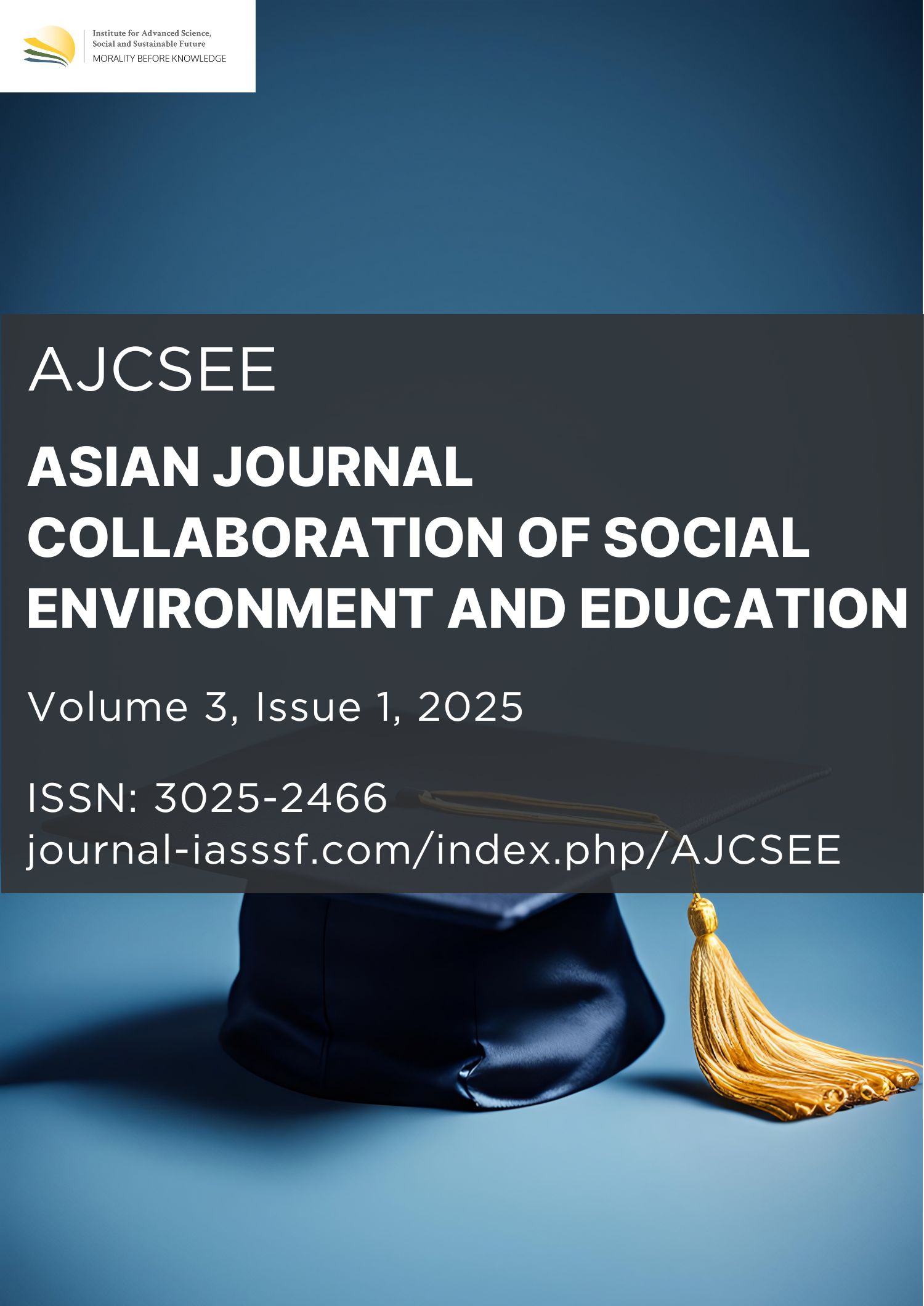Toward holistic education: Performance-based student affairs management with social and institutional collaboration
DOI:
https://doi.org/10.61511/ajcsee.v3i1.2025.1691Keywords:
school performance, student discipline, student managementAbstract
Background: Student management is an important aspect in school management that aims to provide the best educational services to students. In recent decades, research has emphasized the importance of performance-based student management in improving the quality of education. This approach focuses not only on administrative aspects, but also on the development of student character and competence through structured and measurable programs. Methods: This study uses a qualitative approach with a case study. Data were collected through in-depth interviews, direct observation, and document analysis. The focus of the study includes student planning, student admissions, orientation, attendance arrangements, and student discipline. Findings: This study found that student management is carried out in a structured manner through activity planning, performance-based selection systems, new student orientation, attendance monitoring, and character development through extracurricular activities. The entire process is supported by the use of technology to enhance administrative efficiency and parental engagement. Conclusion: The implementation of performance-based student management can improve the quality of education and shape the character of students better. Schools need to strengthen the student selection system with a more comprehensive method and improve student development programs through a personal approach and the use of educational technology. Novelty/Originality of this article: This study offers new insights into the implementation of performance-based student management in Islamic-based high schools, which can be a model for other schools in improving the effectiveness of student management as a whole.
References
Al-Rahmi, W. M., Alzahrani, A. I., Yahaya, N., Alalwan, N., & Kamin, Y. B. (2020). Digital communication: Information and communication technology (ICT) usage for education sustainability. Sustainability, 12(12), 5052. https://doi.org/10.3390/su12125052
Amalia, S. A. (2023). Manajemen Ekstrakurikuler Teater Extra di SMA Muhammadiyah 1 Gresik: Manajemen Ekstrakurikuler Teater Extra di SMA Muhamamdiyah 1 Gresik. Jurnal Pendidikan Sendratasik, 13(1), 217–227. https://doi.org/10.26740/jps.v13n1.p217%20-%20227
Anderson, C. A., & Dill, K. E. (2000). Video games and aggressive thoughts, feelings, and behavior in the laboratory and in life. Journal of personality and social psychology, 78(4), 772. https://psycnet.apa.org/doi/10.1037/0022-3514.78.4.772
Bennett, R. E. (2011). Formative assessment: A critical review. Assessment in education: principles, policy & practice, 18(1), 5-25. https://doi.org/10.1080/0969594X.2010.513678
Biggs, J. (2003). Teaching for Quality Learning at University. Open University Press.
Black, P., & Wiliam, D. (1998). Assessment and classroom learning. Assessment in Education: principles, policy & practice, 5(1), 7-74. https://doi.org/10.1080/0969595980050102
Black, P., & Wiliam, D. (2009). Developing the theory of formative assessment. Educational Assessment, Evaluation and Accountability (formerly: Journal of personnel evaluation in education), 21(1), 5-31. https://doi.org/10.1007/s11092-008-9068-5
Boud, D., & Falchikov, N. (2007). Rethinking Assessment in Higher Education: Learning for the Longer Term. Routledge.
Cizek, G. J. (2012). Setting Performance Standards: Foundations, Methods, and Innovations. Routledge.
Coburn, C. E., & Penuel, W. R. (2016). Research–practice partnerships in education: Outcomes, dynamics, and open questions. Educational researcher, 45(1), 48-54. https://doi.org/10.3102/0013189X16631750
Danielson, C. (2007). The Framework for Teaching Evaluation Instrument. Pearson.
Darling-Hammond, L. (2010). The Flat World and Education: How America's Commitment to Equity Will Determine Our Future. Teachers College Press.
Darling-Hammond, L., & Bransford, J. (2005). Preparing Teachers for a Changing World: What Teachers Should Learn and Be Able to Do. Jossey-Bass.
Dimmock, C., Tan, C. Y., Nguyen, D., Tran, T. A., & Dinh, T. T. (2021). Implementing education system reform: Local adaptation in school reform of teaching and learning. International Journal of Educational Development, 80, 102302. https://doi.org/10.1016/j.ijedudev.2020.102302
Dweck, C. S. (2006). Mindset: The New Psychology of Success. Random House.
Faisal, P., & Kisman, Z. (2020). Information and communication technology utilization effectiveness in distance education systems. International journal of engineering business management, 12, 1847979020911872. https://doi.org/10.1177/1847979020911872
Fullan, M. (2001). The New Meaning of Educational Change. Teachers College Press.
Hargreaves, A., & Fullan, M. (2012). Professional Capital: Transforming Teaching in Every School. Teachers College Press.
Harini, H., Ripki, A. J. H., Sulistianingsih, S., Herlina, H., & Putri, A. (2024). Digital Transformation: The Utilization of Information and Communication Technology to Enhance Educational Management Efficiency in the Modern Era. Jurnal Minfo Polgan, 13(2), 1668-1674. https://doi.org/10.33395/jmp.v13i2.14195
Hattie, J., & Timperley, H. (2007). The power of feedback. Review of educational research, 77(1), 81-112. https://doi.org/10.3102/003465430298487
Leithwood, K., & Jantzi, D. (2000). The effects of transformational leadership on organizational conditions and student engagement with school. Journal of educational administration, 38(2), 112-129. https://doi.org/10.1108/09578230010320064
Levatino, A., Verger, A., Camphuijsen, M., Termes, A., & Parcerisa, L. (2024). School governance through performance-based accountability: A comparative analysis of its side effects across different regulatory regimes. Review of Research in Education, 48(1), 248-286. https://doi.org/10.3102/0091732X241270672
McMillan, J. H. (2013). Classroom Assessment: Principles and Practice for Effective Standards-Based Instruction. Pearson Education.
Mian, S. H., Salah, B., Ameen, W., Moiduddin, K., & Alkhalefah, H. (2020). Adapting universities for sustainability education in industry 4.0: Channel of challenges and opportunities. Sustainability, 12(15), 6100. https://doi.org/10.3390/su12156100
Mirata, V., Hirt, F., Bergamin, P., & van der Westhuizen, C. (2020). Challenges and contexts in establishing adaptive learning in higher education: findings from a Delphi study. International Journal of Educational Technology in Higher Education, 17(1), 32. https://doi.org/10.1186/s41239-020-00209-y
Moleong, L. J. (2021). Methodology Study Qualitative. PT Remaja Rosdakarya.
Mulford, W. R. (2003). School Leaders: Changing Roles and Impact on Teacher and School Effectiveness. OECD, Education Working Paper No. 6.
Pagès, M. (2021). Enacting performance-based accountability in a Southern European school system: between administrative and market logics. Educational Assessment, Evaluation and Accountability, 33(3), 535-561. https://doi.org/10.1007/s11092-021-09359-7
Reeves, D. B. (2004). Ahead of the Curve: The Power of Assessment to Transform Teaching and Learning. Association for Supervision and Curriculum Development.
Shulman, L. (1987). Knowledge and teaching: Foundations of the new reform. Harvard educational review, 57(1), 1-23. https://doi.org/10.17763/haer.57.1.j463w79r56455411
Stiggins, R. J. (2004). New Assessments for New Purposes: Implications of the Standards-Based Movement for Student Assessment. Yearbook of the National Society for the Study of Education, 103(1), 201-218. https://files.eric.ed.gov/fulltext/ED429990.pdf
Downloads
Published
How to Cite
Issue
Section
Citation Check
License
Copyright (c) 2025 Satunggale Kurniawan, Muhammad Afifi Rahman, Yuventius Sugiarno; Eby Era Shevilla

This work is licensed under a Creative Commons Attribution 4.0 International License.















